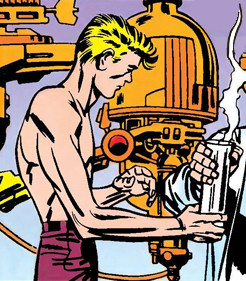In the Captain America Series, there are some, but few examples of logical appeals. Since people look up to Captain America since he has "super-human" characteristics, it is hard to have a logical appeal to him. One of the logical appeals is the fact that Captain America was created during a time commie smasher" era didn't for the Captain didn't last too long, according to some sources). Another example is the science behind Captain America's powers and how he acquired them through experimentation. Operation: Rebirth, was the experiment that Rodger's underwent, which involved administering him "Super-soldier serum" intravenously and orally and putting him in a "vita-ray" chamber which emitted different wavelengths of radiation to his body in order to accelerate the process of the serum in the body, making him the most perfect human body possible, while still being human. The scientific explanation of how he got his powers makes the text more realistic, which is one of the main ways it shows logos to its readers.
In the Captain America Series, there are some, but few examples of logical appeals. Since people look up to Captain America since he has "super-human" characteristics, it is hard to have a logical appeal to him. One of the logical appeals is the fact that Captain America was created during a time commie smasher" era didn't for the Captain didn't last too long, according to some sources). Another example is the science behind Captain America's powers and how he acquired them through experimentation. Operation: Rebirth, was the experiment that Rodger's underwent, which involved administering him "Super-soldier serum" intravenously and orally and putting him in a "vita-ray" chamber which emitted different wavelengths of radiation to his body in order to accelerate the process of the serum in the body, making him the most perfect human body possible, while still being human. The scientific explanation of how he got his powers makes the text more realistic, which is one of the main ways it shows logos to its readers.

I think more importantly than the actual use of logic, is the illusion of logic. Like you previously mentioned, there are a lot of 'scientific' processes that these superheroes go through in order to complete their transformation. Although these experiments are highly unlikely and unrealistic, the use of 'science' gives the viewer that this may be a possibility in the future with the advancement of technology and knowledge.
ReplyDeleteI really like the text you chose. I find it to be different and very interesting. I agree that logic is hard to find in fiction, but I think there is logic present there, but it is unrealistic or based on possibilities and the world created in the comic. I am not familiar with the Captain American series, but I know often times comics would base their logic on possible future technological advances. For example some comics would provide "scientific evidence" for the emergence of hover boards or for a human having extraordinary abilities. I know it's not concrete logic, but I think it is something to look over. Also I like that you included a history component in your analysis. Comics often base certain situations on past occurrences or major events in history. I agree with your analysis and found it very compelling to read.
ReplyDelete